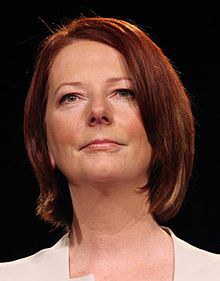Australia's Leader Meets Sexist Attacks Head On

Misogynist political talk has become a national issue in Australia after Prime Minister Julia Gillard confronted the Opposition leader for participating in sexist dialogue that this commentary's author had recently helped document.
Australia’s first female prime minister, Julia Gillard, made international headlines last week with her fiery speech to the nation’s parliament in which she denounced the “sexism and misogyny” of the leader of the Opposition, Tony Abbott.
It is rare, almost unprecedented, for a female political leader to identify and denounce her experience of sexism while in office. Generally, perhaps fearing they will be accused of divisive politics, of “playing the gender card,” women politicians either deny or underplay these experiences. In the two and quarter years since she became prime minister, Gillard herself has until very recently kept silent about such things. She has made a couple of low-key speeches to women’s organizations, such as the fund-raising Emily’s List (based on the U.S. group of the same name), and expressed her pride in being Australia’s first woman head of government, but she has not defended herself in the face of a continued vicious onslaught against her that started almost as soon as she assumed her high office.
She has been denounced as a “liar,” even being called “Juliar,” for changing her policy on the introduction of a carbon tax. Previous prime ministers who have similarly backtracked on promised policies have been condemned for “back-flips” but not called “liars.” Anti-carbon tax rallies outside parliament house in March 2011 saw demonstrators holding placards that described Gillard as a “bitch” and a “witch.” Tony Abbott, together with several of his female colleagues, spoke at these rallies, with the signs in clear view.
Gillard was provoked to come out fighting by several recent events. Her beloved father died unexpectedly a few weeks ago. She was still grieving when it became known that a radio shock jock, Alan Jones who, like Rush Limbaugh, is politically active as well as being a master of hate speech on the airwaves, made some provocative remarks at a dinner hosted by the junior wing of Tony Abbott’s Liberal Party.
Jones told his raucous audience that the prime minister’s father had “died of shame” because of the constant “lies” his daughter had told parliament. Jones thought he was speaking to a private function but in a Romney-like episode (the 47 percent), a journalist at the dinner taped the remarks. Once published they caused an uproar and led to a successful women-led boycott of Jones’s advertisers.
Australia’s parliament is, rather like the British House of Commons, a combative and often hostile arena. Parliamentarians speak directly to each other, in a confined space, in an atmosphere that has grown increasingly toxic since the 2010 federal election when Gillard failed to win an outright majority of seats. She has since governed with several independent MPs giving her a razor thin majority, often of only one vote, and with Tony Abbott trying desperately to topple her by having her lose a vote on a the floor of the house. If this happened, Gillard could be forced to an early election, which, on currently polling, she is likely to lose.
It was in this atmosphere that Tony Abbott made the remarks that incited Julia Gillard to give the speech of her life. He moved a motion to have the speaker of the parliament removed (an unprecedented action in itself) because of his now-published text messages using crude language to describe female genitalia. As well as denouncing the speaker, Tony Abbott turned his sights on the prime minister and, astonishingly, said that day was “another day of shame for a government which should already have died of shame.”
Gillard’s rage was palpable as she rose to speak.
“I will not be lectured about sexism and misogyny by this man,” she said. “I will not.” She drew attention to “the Opposition leader’s repulsive double standards” towards women before reaching her peroration:
... the Government is not dying of shame, my father did not die of shame, what the Opposition leader should be ashamed [she emphasized the word] of is his performance in this Parliament and the sexism he brings with it.
As she laid out her case for the sexism of the Opposition leader, Gillard cited examples such as his remark, when he was minister for health in a previous administration, that abortion was “the easy way out.” She also drew on examples that I had used in a lengthy speech, delivered just a few weeks earlier, in which I had made the case for her “political persecution” on gender grounds.
In that speech, which was widely circulated through social media, I documented the sexist, offensive and in many cases pornographic images of Gillard that populate FaceBook and are spread via chain emails. I also argued that she had been forced to endure conduct that is actually unlawful in the workplace. Under Australian laws, such as the Sex Discrimination Act 1984 and the Fair Work Act 2009, it is an offence to send sexually explicit emails, just as the existence of a hostile work environment constitutes sex discrimination where it is found to be gender-based.
A number of commentators have suggested that my speech may well have emboldened Julia Gillard to finally declare “enough is enough” and to make her electrifying speech. If I helped give her the strength, I am glad, but no one could have done what she did without the grit and courage that exemplifies her as a leader.
More articles by Category: Feminism, International, Media, Politics
More articles by Tag:



























